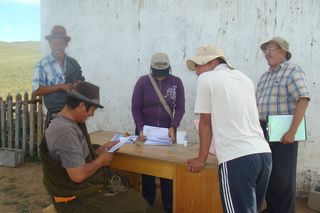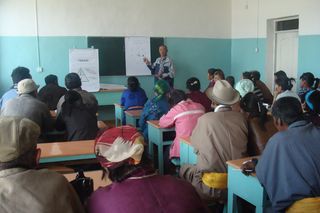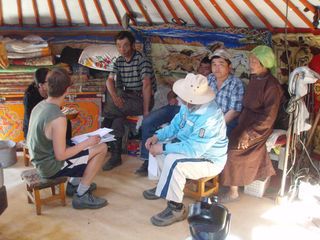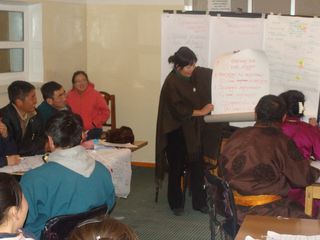The project is in reaction to a specific natural disaster called dzud, which in the first half of 2010 left many pastoral families without livelihoods. The purpose of the project was not only to provide immediate humanitarian relief, which would solve the pressing food shortage; but also to focus on long-term needs of inhabitants and its aim was therefore to restore the livelihoods of affected families in the Bayan – Ondor sum (district) of the most seriously affected Ovorhangai Province.
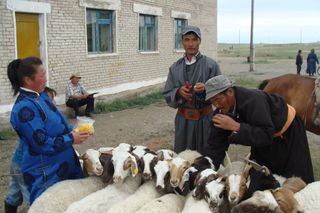 Critisis situation
Critisis situation
The term dzud means an exceptional situation during winter or spring when livestock have no access to food and/or are exposed to extremely low temperatures, which leads to mass death losses. The situation is usually caused by several unfavorable factors, whose impacts are deepened by their mutual combination. In winter 2010, problems were caused by above-average snowfall (the layer of snow prevented the animals’ access to fodder), unusually strong freezing and by dry weather in the summer before, which meant that the herdsmen were unable to gather sufficient fodder supplies for winter.
During the winter of 2009/2010, 9 million livestock died, this represents about 21 % of the overall number of 44 million before the catastrophe. However, the losses did not take place evenly, which meant that there were some unaffected areas, whereas in other areas the losses were huge.
In Mongolia, livestock losses have a fatal impact on the inhabitants’ economic situation and their food self-sufficiency. Cattle breeding still represent about 20 % of the country’s GDP and is the main source of subsistence for one third of the inhabitants. These pastoral families’ existence is put at risk by any losses in their herds.
The Ovorhangai province in central Mongolia, where the project was implemented, was one of the most seriously affected. The Bayan – Ondor sum was chosen by Caritas Czech Republic (CCR) in consultation with Mongolian experts on the basis of logistical capacity.
Provided aid
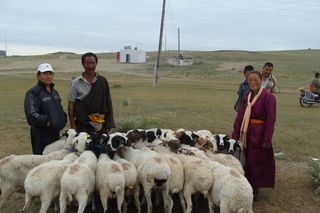 The beneficiaries of aid were chosen on the basis of consultations with local government representatives and two thorough investigations in affected households.
The beneficiaries of aid were chosen on the basis of consultations with local government representatives and two thorough investigations in affected households.
1,991 head of cattle, sheep, goats, cows and horses, were divided among 40 families. The average number of animals provided to one family was 50, the amount of aid provided to individual families was set according to the size of the families and according to how needy the families were (e.g., other sources of income of the families were taken into account).
CCR also helped 26 persons from 15 households start their own small business. These people are associated in six self-help groups of producers, who process local resources (felt production, production of ropes made of horsehair), or provide hitherto missing services (production of wooden furniture for yurts, pastry supply, sewing of clothes and coverings for yurts).
The purpose of the project was to decrease the risk that a catastrophe with similar repercussions will take place again in the future. In this respect, it is crucial to inform the herdsmen, who are often not aware that by using some traditional cattle breeding procedures they contribute to pastures devastation and increase their own vulnerability to dzud. CCR thus provided not only material aid, but together with experts in grassland pastoralism prepared a practical handbook containing recommendations concerning sustainable breeding in local conditions as well as measures by which the herdsmen can reduce the future risk of livestock losses. Training in the same issues was also organized, in which herdsmen and local government representatives took part.
Sustainability of project results
Local government representatives actively cooperated with CCR throughout project implementation. They also help CCR workers to monitor how the aid is provided.
Name of the project: Restoration of Livelihoods of Families Affected by the Dzud Natural Disaster
Implementation period: April – December 2010
Sources of funding: The Ministry of Foreign Affairs of the Czech Republic


